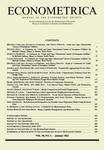This article includes a list of general references, but it lacks sufficient corresponding inline citations .(February 2022) |
 | |
| Discipline | Economics |
|---|---|
| Language | English |
| Edited by | Marina Halac |
| Publication details | |
| History | 1933–present |
| Publisher | Wiley-Blackwell on behalf of the Econometric Society |
| Frequency | Bimonthly |
| 5.844 (2020) | |
| Standard abbreviations | |
| ISO 4 | Econometrica |
| Indexing | |
| CODEN | ECMTA7 |
| ISSN | 0012-9682 (print) 1468-0262 (web) |
| LCCN | 34016980 |
| JSTOR | 00129682 |
| OCLC no. | 01567366 |
| Links | |
Econometrica is a peer-reviewed academic journal of economics, publishing articles in many areas of economics, especially econometrics. It is published by Wiley-Blackwell on behalf of the Econometric Society. The current editor-in-chief is Marina Halac.